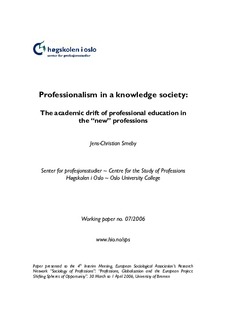Professionalism in a knowledge society: The academic drift of professional education in the “new” professions
Working paper
Permanent lenke
https://hdl.handle.net/20.500.12199/3078Utgivelsesdato
2006Metadata
Vis full innførselSamlinger
- SPS - Documents [424]
Sammendrag
A central argument in this paper is that a greater emphasis on knowledge and epistemological cultures is needed to understand the challenges of professionalism in modern globalized knowledge societies. A knowledge society is not simply a society of experts or an increasing production and flow of knowledge, but rather a society into which knowledge cultures have spilled and woven their tissues into society as a whole (Knorr Cetina 1997, 2001). We live in a world of increased reflexivity mediated by expert systems. Individuals engage with the wider environment and with themselves through information produced by specialists which they routinely interpret and act on in everyday life (Giddens 1990). The democratisation of knowledge has been accompanied by a growing contestability of knowledge claims. As more and more actors are being drawn into the field of knowledge production, the self-legitimation of the older knowledge elites becomes less certain. Professionals do therefore not just need knowledge as a basis for carrying out their tasks; they also have to a much greater extent to defend their professional practice scientifically towards other professional groups as well as the lay audience. The paper discuss the extent to which the move of professional education in the semi-professions from a vocational apprentice based model to an academic model institutionalised as part of higher education may be considered as part of a new professional project that serve the demands of the 21st century societies.
